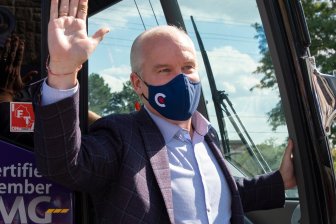Voters getting split between Liberals and NDP creating path for Tories election poll
As the federal election campaign gets tighter, a new poll provides hints on where the parties could see their support grow or shrink â€" and appears to show a growing split in the progressive vote between the Liberals and the NDP.

The Ipsos poll conducted exclusively for Global News suggests that split could create an opening for the Conservative Party, which not only has the most locked-in support but is also seen as the campaign with the most momentum.
“Unless the progressives united behind one particular choice, they’re creating a good opportunity for Erin O’Toole and the Conservative Party,†said Darrell Bricker, CEO of Ipsos Public Affairs.
Nearly half of Conservative voters surveyed by Ipsos said they are absolutely certain of their vote choice. Although that’s tied with the Liberals’ support, the Tories have seen that number grow by three points since the start of the campaign, compared to just one point for Justin Trudeau’s party.
Story continues below advertisement
Read more: Federal leaders face off over COVID-19 and vaccinations in first election debate
A quarter of those surveyed also said they are now more likely to vote for the Conservatives than they were at the start of the campaign, up five points from three weeks ago and higher than any other party.
Add in the 34 per cent of voters surveyed who feel the Conservatives have the most momentum in the campaign â€" and 72 per cent of likely Conservative voters who feel the same â€" and Bricker says the spotlight is about to shine brighter on O’Toole.
“The question is, over the next couple of weeks, will he be able to stand up to it?†he said.
“What we saw in the last election campaign was that his predecessor, Andrew Scheer, was not able to deal with it. Let’s see if O’Toole is made of different stuff.â€
 2:12 Canada election: Federal party leaders square off in 1st French-language debate Canada election: Federal party leaders square off in 1st French-language debate
2:12 Canada election: Federal party leaders square off in 1st French-language debate Canada election: Federal party leaders square off in 1st French-language debate The Ipsos poll, which surveyed over 1,500 Canadians online at the end of August, suggests the Liberals are continuing to stumble as the campaign enters its second half.
Story continues below advertisement
Only 17 per cent of respondents said the Liberals were the party with the most momentum, down five points from the start of the campaign. Critically, only 39 per cent of Liberal voters think their own party’s campaign is gaining the most traction.
Thirty-eight per cent of voters also said they are now less likely to vote for the Liberals than they were when the election was called, surpassing all other parties. Just 17 per cent said they are more likely to vote Liberal.
The New Democrats, meanwhile, are seeing their fortunes surge, with one in four voters â€" and 67 per cent of NDP voters â€" saying the party has the most momentum, up seven points. It also boasted the lowest number of voters who are less likely to support them, at 26 per cent, while 24 per cent are more likely to cast a ballot for the party.
Trending Stories

O’Toole promises to implement national proof of COVID-19 vaccination system

3-year-old boy and father found alive after Quebec Amber Alert: police
Where the progressive split appears to be occurring is in voters’ second choices. The NDP was the preferred second choice of a plurality of voters surveyed, with 22 per cent keeping the party in their back pocket, followed by the Liberals at 15 per cent and the Conservatives and Greens at 11 per cent each.
Read more: Liberals fall, Conservatives steady as election race remains neck-and-neck: poll
Story continues below advertisement
While Liberal and NDP voters chose the other as their second choice most often, Liberal voters far preferred the NDP, at 46 per cent, than NDP voters did the Liberals (39 per cent).
“The biggest challenge to the Liberal Party going forward is the potential that more progressive voters who are currently with the Liberal Party and are disappointed that they were put into this election, disappointed with the prime minister â€" more and more are taking a serious look at the NDP,†Bricker said.
“If that happens, the potential that the Liberal Party will go down even further than it is right now certainly exists.â€
Bricker noted that Liberal and NDP voters who picked the other party as their second choice tended to be younger and more vulnerable, with lower household incomes and disproportionately LGBTQ2 and BIPOC (Black, Indigenous or people of colour).
“They tend to be among the least reliable voters in the electorate, and only vote when they’re really energized by a campaign,†he said. “And right now, they’re confused … and are looking for a champion.â€
 0:39 If election were held tomorrow, Liberals would only get 31 per cent of popular vote: poll If election were held tomorrow, Liberals would only get 31 per cent of popular vote: poll
0:39 If election were held tomorrow, Liberals would only get 31 per cent of popular vote: poll If election were held tomorrow, Liberals would only get 31 per cent of popular vote: poll Conservative voters, by contrast, appear to be evenly dividing their second choices among the other parties â€" but once again, the NDP were the preferred choice at 18 per cent, compared to 12 per cent for the Liberals.
Story continues below advertisement
The Tories were the preferred second choice for Bloc Quebecois voters at 23 per cent, slightly ahead of the 20 per cent who would go for the Liberals â€" suggesting an opportunity for O’Toole to make inroads in Quebec.
Despite all this, the Liberals were still seen as the party most likely to win the election, with 38 per cent of voters surveyed saying so compared to 22 per cent who picked the Conservatives. Just seven per cent said the NDP will win.
The poll also suggests the Greens are in freefall, with only 26 per cent of likely voters absolutely sure they will vote for the party. Less than half of Green voters â€" 44 per cent â€" said they are certain they will cast a ballot this election, compared to two thirds or more of Conservative, Liberal and NDP voters.
The party has also attracted few additional voters, with just eight per cent of those surveyed saying they are more likely to vote Green, while 36 per cent are now less likely.
Among Bloc Quebecois voters, 43 per cent said they are certain of their vote and 63 per cent are sure they will go to the polls. Eighteen per cent of voters in Quebec said they’ve been swayed by the Bloc, compared to 38 per cent who are less likely.
These are some of the findings of an Ipsos poll conducted between August 27 and 30, on behalf of Global News. For this survey, a sample of n = 1,501 Canadians aged 18+ was interviewed online, via the Ipsos I-Say panel and non-panel sources. Respondents earn a nominal incentive for their participation. Quotas and weighting were employed to balance demographics to ensure that the sample’s composition reflects that of the adult population according to Census data and to provide results intended to approximate the sample universe. The precision of Ipsos polls which include non-probability sampling is measured using a credibility interval. In this case, the poll is accurate to within ± 2.9 percentage points, 19 times out of 20, had all Canadians been polled. The credibility interval will be wider among subsets of the population. All sample surveys and polls may be subject to other sources of error, including, but not limited to coverage error, and measurement error. Ipsos abides by the disclosure standards established by the CRIC, found here: https://canadianresearchinsightscouncil.ca/standards/
Advertisement
© 2021 Global News, a division of Corus Entertainment Inc.
0 Response to "Voters getting split between Liberals and NDP creating path for Tories election poll"
Post a Comment